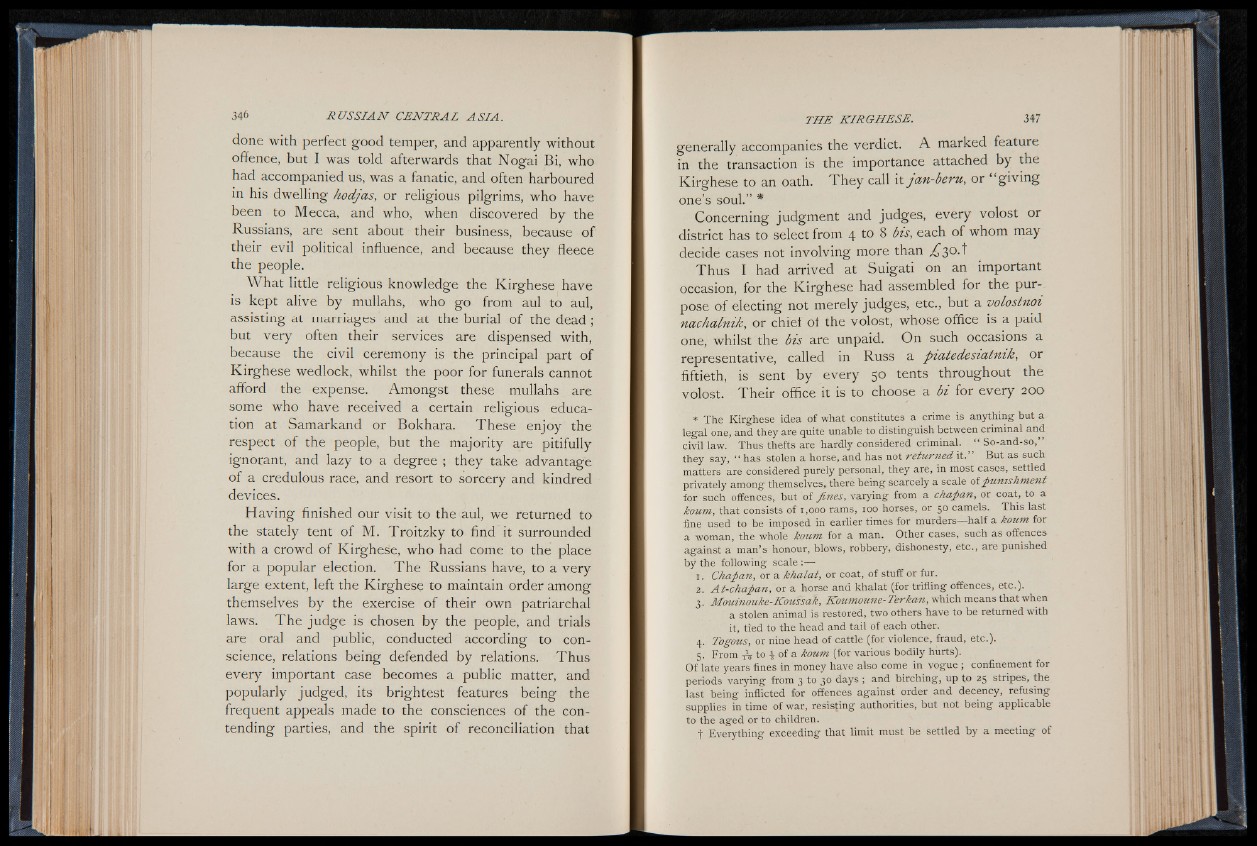
done with perfect good temper, and apparently without
offence, but I was told afterwards that Nogai Bi, who
had accompanied us, was a fanatic, and often harboured
in his dwelling hodjas, or religious pilgrims, who have
been to Mecca, and who, when discovered by the
Russians, are sent about their business, because of
their evil political influence, and because they fleece
the people.
What little religious knowledge the Kirghese have
is kept alive by mullahs, who go from aul to aul,
assisting at marriages and at the burial of the dead ;
but very often their services are dispensed with,
because the civil ceremony is the principal part of
Kirghese wedlock, whilst the poor for funerals cannot
afford the expense. Amongst these mullahs are
some who have received a certain religious education
at Samarkand or Bokhara. These enjoy the
respect of the people, but the majority are pitifully
ignorant, and lazy to a degree ; they take advantage
of a credulous race, and resort to sorcery and kindred
devices.
Having finished our visit to the aul, we returned to
the stately tent of M. Troitzky to find it surrounded
with a crowd of Kirghese, who had come to the place
for a popular election. The Russians have, to a very
large extent, left the Kirghese to maintain order among
themselves by the exercise of their own patriarchal
laws. The judge is chosen by the people, and trials
are oral and public, conducted according to conscience,
relations being defended by relations. Thus
every important case becomes a public matter, and
popularly judged, its brightest features being the
frequent appeals made to the consciences of the contending
parties, and the spirit of reconciliation that
generally accompanies the verdict. A marked feature
in the transaction is the importance attached by the
Kirghese to an oath. They call it jan-beru, or “ giving
one’s soul.” *
Concerning judgment and judges, every volost or
district has to select from 4 to 8 bis, each of whom may
decide cases not involving more than ¿2,0. t
Thus I had arrived at Suigati on an important
occasion, for the Kirghese had assembled for the purpose
of electing not merely judges, etc., but a volostnoi
nachalnik, or chief of the volost, whose office is a paid
one, whilst the bis are unpaid. On such occasions a
representative, called in Russ a piatedesiatmk, or
fiftieth, is sent by every 50 tents throughout the
volost. Their office it is to choose a bi for every 200
* The Kirghese idea of what constitutes a crime is anything but a
legal one, and they are quite unable to distinguish between criminal and
civil law. T h u s thefts are hardly considered criminal. “ So-and-so,”
they say, “ has stolen a horse, and has not returned it.” But as such
matters are considered purely personal, they are, in most cases, settled
privately among themselves, there b eing scarcely a scale punishment
for such offences, but of fin es , varying from a chapan, or coat, to a
koum, that consists of 1,000 rams, 100 horses, or 50 camels. This last
fine used to be imposed in earlier times for murders half a koum for
a woman, the whole koum for a man. Other cases, such as offences
against a man’ s honour, blows, robbery, dishonesty, etc., are punished
by the following scale :—
1. Chapan, or a khalat, or coat, of stuff or fur.
2. At-chapan, or a horse and khalat (for trifling offences, etc.).
3. Mouinouke-Koussak, Koumoune- Terkan, which means that when
a stolen animal is restored, two others have to be returned with
it, tied to the head and tail of each other.
4. Togous, or nine head of cattle (for violence, fraud, etc.).
5. From TV to | of a koum (for various bodily hurts).
Of late years fines in money have also come in vogue ; confinement for
periods varying from 3 to 30 days ; and birching, up to 25 stripes, the
last being inflicted for offences against order and decency, refusing
supplies in time of war, resisting authorities, but not being applicable
to the aged or to children.
t Everything exceeding that limit must be settled by a meeting of